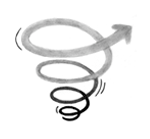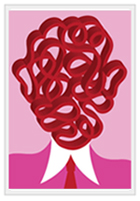
A growing number of young men are struggling with depression around the time of the birth of their first child. Many first-time dads would rather stifle their feelings than talk about them, making the home situation more heated and fraught, and their sense of helplessness exacerbated.
With no socially acceptable forum where they might share and explore some of these feelings, male postpartum depression is easily eclipsed by its maternal counterpart, and often missed altogether. The following is abridged and edited from an article that appeared in Parents Magazine.


 The following selection from a recent Elle Magazine article about the use of antidepressants to improve couple relations (
The following selection from a recent Elle Magazine article about the use of antidepressants to improve couple relations ( In a
In a